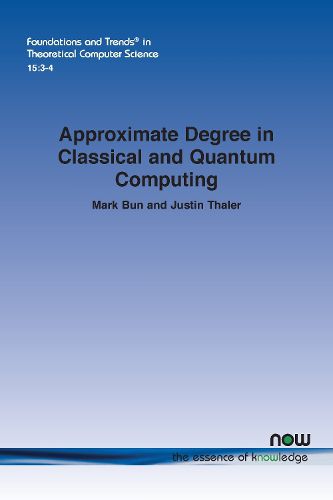Readings Newsletter
Become a Readings Member to make your shopping experience even easier.
Sign in or sign up for free!
You’re not far away from qualifying for FREE standard shipping within Australia
You’ve qualified for FREE standard shipping within Australia
The cart is loading…






This title is printed to order. This book may have been self-published. If so, we cannot guarantee the quality of the content. In the main most books will have gone through the editing process however some may not. We therefore suggest that you be aware of this before ordering this book. If in doubt check either the author or publisher’s details as we are unable to accept any returns unless they are faulty. Please contact us if you have any questions.
The ability (or inability) to represent or approximate Boolean functions by polynomials is a central concept in complexity theory, underlying interactive and probabilistically checkable proof systems, circuit lower bounds, quantum complexity theory, and more. In this book, the authors survey what is known about a particularly natural notion of approximation by polynomials, capturing pointwise approximation over.
This book covers recent progress on proving approximate degree lower and upper bounds and describes some applications of the new bounds to oracle separations, quantum query and communication complexity, and circuit complexity. The authors explain how several of these advances have been unlocked by a particularly simple and elegant technique, called dual block composition, for constructing solutions to this dual linear program. They also provide concise coverage of even more recent lower bound techniques based on a new complexity measure called spectral sensitivity. Finally, they show how explicit constructions of approximating polynomials have been inspired by quantum query algorithms.
This book provides a comprehensive review of the foundational and recent developments of an important topic in both classical and quantum computing. The reader has a considerable body of knowledge condensed in an accessible form to quickly understand the principles and further their own research.
$9.00 standard shipping within Australia
FREE standard shipping within Australia for orders over $100.00
Express & International shipping calculated at checkout
This title is printed to order. This book may have been self-published. If so, we cannot guarantee the quality of the content. In the main most books will have gone through the editing process however some may not. We therefore suggest that you be aware of this before ordering this book. If in doubt check either the author or publisher’s details as we are unable to accept any returns unless they are faulty. Please contact us if you have any questions.
The ability (or inability) to represent or approximate Boolean functions by polynomials is a central concept in complexity theory, underlying interactive and probabilistically checkable proof systems, circuit lower bounds, quantum complexity theory, and more. In this book, the authors survey what is known about a particularly natural notion of approximation by polynomials, capturing pointwise approximation over.
This book covers recent progress on proving approximate degree lower and upper bounds and describes some applications of the new bounds to oracle separations, quantum query and communication complexity, and circuit complexity. The authors explain how several of these advances have been unlocked by a particularly simple and elegant technique, called dual block composition, for constructing solutions to this dual linear program. They also provide concise coverage of even more recent lower bound techniques based on a new complexity measure called spectral sensitivity. Finally, they show how explicit constructions of approximating polynomials have been inspired by quantum query algorithms.
This book provides a comprehensive review of the foundational and recent developments of an important topic in both classical and quantum computing. The reader has a considerable body of knowledge condensed in an accessible form to quickly understand the principles and further their own research.